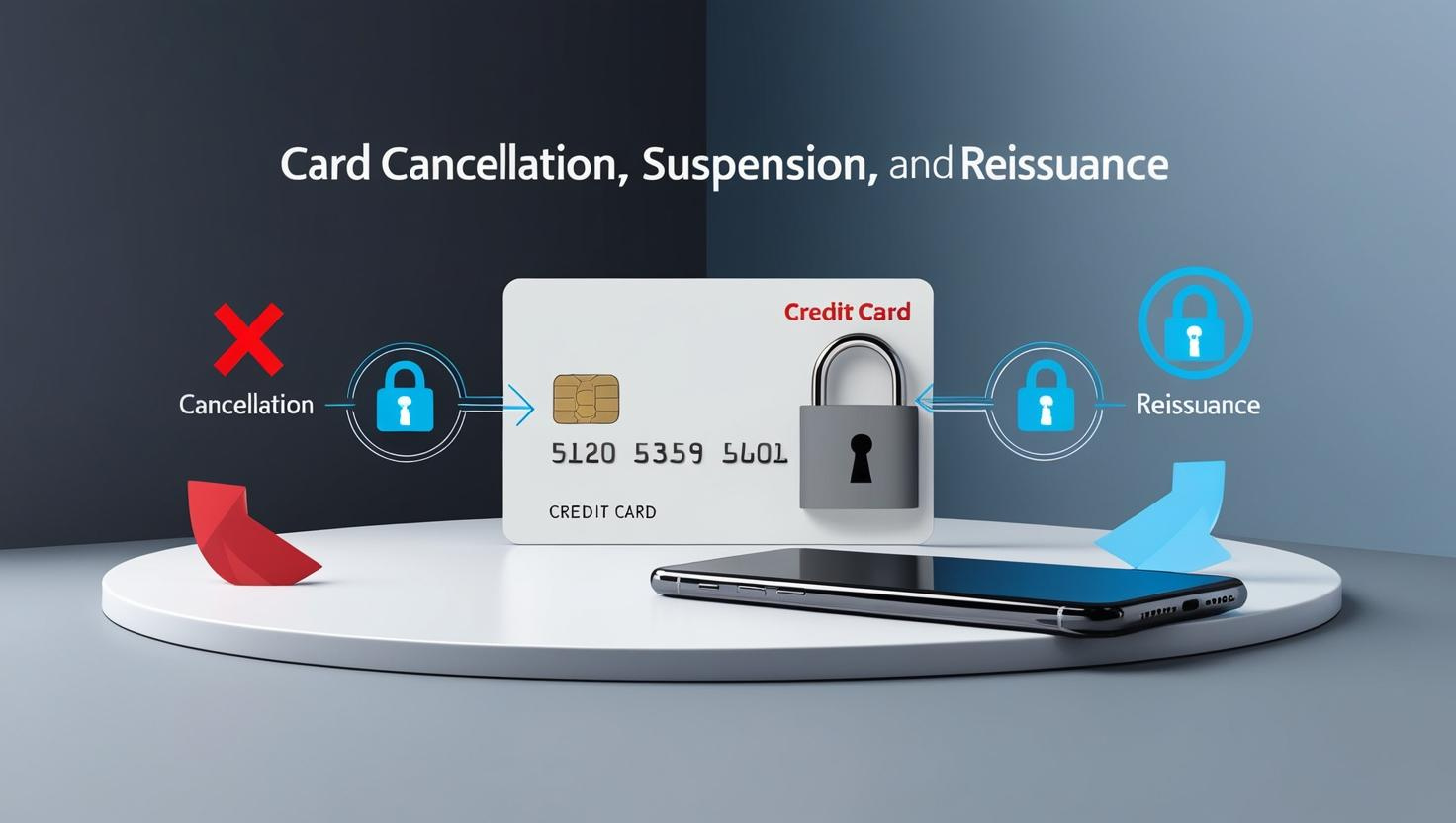Anúncios
In a scenario where credit, debit, or prepaid cards have become virtually indispensable, it is common for situations to arise that require cancellation, suspension, or reissuance of the card. These actions can occur for various reasons, including dissatisfaction with fees, changing financial institutions, loss, theft, or suspected fraud. Knowing how to proceed in each case is crucial to avoid inconvenience, keep finances organized, and ensure that outstanding obligations are settled correctly.
Additionally, canceling a card doesn’t just mean stopping its use immediately. One must pay attention to details such as future invoices and installments that may still exist, to avoid the risk of accumulating debt due to lack of information. Emergency situations, such as theft or cloning, require an immediate response, including preventive blocking and contact with the issuer to prevent further losses.
Reissuing cards also often raises questions. Many people are unaware, for example, whether they will need to sign a new contract when renewing the card, if the card number will remain the same, or if it is necessary to review previously registered automatic payments. On the other hand, understanding what happens to the history of the previous card can prevent surprises when requesting a new product from the institution or even in possible impacts on one’s financial reputation.
Cancellation, Suspension, and Reissuance of Cards
Cancellation occurs when the cardholder decides to terminate the relationship with the card or when the institution itself makes this decision in specific cases. Suspension can be an intermediate step, often temporary, used in emergency situations or for internal analysis. Reissuance refers to replacing the current card with a new one (with or without a change of number), in order to ensure security or practicality.
• Definitive Cancellation: The client formally closes the card account, no longer having access to the associated services.
• Suspension or Blocking: The institution temporarily suspends the card’s usage, either at the client’s request (e.g., loss or theft) or due to suspicion of misuse.
• Reissuance: Issuance of a new card to replace the old one, possibly with the same number or not, depending on the issuer’s policies and the reason for replacement.
Each of these actions has different implications, including possible additional fees or mandatory communications.
Change of Financial Institution
In many cases, the cancellation of a card is directly related to switching banks or migrating to another company that offers more attractive conditions. Before proceeding with the cancellation, pay attention to the following important points.
Contact the Customer Service Center: Make the cancellation request formally, either via phone, app, or in person.
Ensure No Outstanding Invoices or Installments: This avoids unexpected future charges.
Deadlines and Documentation: Each issuer sets a specific deadline to process cancellation. Verify if you need to fill out forms or if a written request is enough (if required by the institution).
Keep the Protocol Number: Retain the protocol number or any proof given by customer service, as it can serve as evidence that you initiated the process within the correct timeframe.
Anúncios
Clear Remaining Debts: It’s essential to settle outstanding invoices, installments, and recent charges before completing the cancellation.
Scheduled Cancellations and Emergency Procedures
In some cases, clients plan card cancellations in advance, either because they want to consolidate spending on another product or simply because they no longer find the service useful. On the other hand, emergency situations—such as theft, loss, or suspected cloning—require immediate cancellation or blocking to prevent fraud and protect the user.
Scheduled Cancellations: These usually involve more planning, allowing the customer to organize installments, redeem loyalty points, and end the contract without financial surprises.
Emergency Procedures: These require speed. The recommendation is to contact the institution immediately to request a preventive block, avoiding unauthorized use by third parties.
Suspension and Preventive Blocking
Suspension (or blocking) is a valuable tool to temporarily halt the use of the card, either at the customer’s or the bank’s initiative. It is commonly used in situations of suspected fraud, registration issues, or even overdue payments (in more extreme cases).
Loss or Theft of the Card: In this case, the cardholder immediately requests preventive blocking to prevent transactions by third parties. The institution typically proceeds with reissuing a new card, usually with a changed number, for increased security.
Suspicion of Fraud or Irregularities: Unusual transactions, purchases in different locations, or very high amounts can trigger a preventive suspension by the bank. The cardholder is then contacted to confirm whether those transactions were legitimate. If discrepancies are found, the card remains blocked, and a new card may be issued.
Delinquency Situations: If there is excessive delay in payment of invoices, some institutions suspend the card until the customer settles the outstanding amount or reaches an agreement. While not common for short delays, this possibility exists and may lead to temporary usage restrictions.
Additional Fees and Costs
Below is a table illustrating possible fees related to the cancellation, suspension, or reissuance of cards. Keep in mind that charges vary based on the policies of each institution.
| Item/Service | Possible Cost | Remarks |
|---|---|---|
| Cancellation by Request | Usually no cost | Exceptions may exist in corporate contracts |
| Reissuance of Card | Fixed fee or waived | Some issuers do not charge, others do |
| Preventive Blocking | Usually no cost | Exclusive for security situations |
| 2nd Copy of PIN | May have a minimal fee | Varies depending on the request channel |
| Urgent Card Delivery | Emergency fee | Applied to expedited delivery requests |
| Reactivation of Card | Usually no cost | In cases of suspension due to error or fraud |
Impact on Credit History
The cancellation of cards itself does not always negatively affect the profile of those requesting it, but there are nuances to observe:
Closing Multiple Accounts Simultaneously: This may reduce the “average length” of the relationship, which is not viewed favorably in some credit history reports.
Outstanding Invoices: If cancellation is done with active debts, credit agencies may interpret this negatively, depending on how it appears on the credit report.
Total Available Credit: Cancelling a card reduces the total available credit, which may affect credit utilization ratios for other products.
Maintaining a balanced history, without excessive openings or closings, is advisable for those wishing to maintain a good reputation with financial institutions.
Common Reasons for Cancellation
Before listing the reasons, it’s important to emphasize that a well-planned cancellation can eliminate unnecessary expenses and hassles, provided the cardholder is aware of ongoing debts.
- Dissatisfaction with Fees
- Inadequate Credit Limit
- Lack of Benefits and Loyalty Programs
- Change of Financial Institution
Dissatisfaction with Fees: When the cost of fees (annual fee, withdrawals, and other charges) becomes excessive and doesn’t match the actual use of the card, cancellation may be a solution. However, it’s worth trying to negotiate a reduction or waiver beforehand.
Inadequate Credit Limit: If the product doesn’t meet the client’s needs—whether with a very low or excessively high limit—seeking alternatives at other banks or new card types may be more advantageous.
Lack of Benefits and Loyalty Programs: Some cards offer points, miles, cashback, or insurance. If the cardholder doesn’t benefit from these, or if there are more attractive options available in the market, cancellation might be considered.
Change of Financial Institution: As mentioned, this decision occurs when the client prefers to migrate to a bank offering better conditions or more aligned with their usage profile. Here, it is essential to ensure debts are cleared before closing the card.

Alternatives to Change Card Network without Cancellation
The card network is the payment system that processes transactions and connects issuers to stores or service providers. Some cards offer specific benefits, such as insurance, loyalty programs, and partner advantages, which depend on both the network and the issuing bank. If a consumer realizes that another network offers benefits more aligned with their profile, they might consider switching.
Not all banks allow the direct change of network while keeping the same contract. In some cases, the current card must be canceled, and a new one requested with the desired network. Other issuers may offer the option of replacing the network without canceling the product, but may require a new credit assessment or alter the usage terms.
Substitution without Cancellation:
° The issuer may allow a “migration” to the new network without closing the contract, simply reissuing the card with new characteristics.
° Typically, the credit limit and payment history remain the same, but it’s important to check if loyalty programs or insurance may change.
Cancellation and Opening of a New Card:
° The issuer may request the client cancel the current card to access a new product, even if it is offered by the same bank.
° There are situations where the credit limit, loyalty program, and relationship may be reevaluated, possibly leading to different conditions than before.
Consequences of Cancellation
If opening a new contract is mandatory, it’s crucial to assess the financial impacts and credit history implications:
• Loss of Benefits: Reward programs, miles, or insurance linked to the card may be lost when the old contract is canceled.
• Annual Fee or Charges: A different card may have different costs and annual fee policies.
• Credit Score: Canceling a card can affect the available credit, which may influence your credit history depending on your spending profile.
Negotiation and Costs
Often, financial institutions may have tailored solutions for customers interested in changing networks. Before proceeding with cancellation, consider:
- Possibility of Fee Waiver or Discounts: If the network change is motivated by high fees or an unattractive loyalty program, discuss alternatives with customer service.
- Special Upgrade Conditions: Depending on your spending profile and relationship duration, the bank may offer better rates or an upgraded card, often with a reduced annual fee.
Steps to Decide
1. Check the Benefits of the New Network: Reward programs, acceptance networks, partnerships, and insurance.
2. Inquire about the Issuer’s Policy: Contact customer service to see if the change can be made without cancellation.
3. Evaluate Cost-Benefit: Is it worth losing points, miles, or history to migrate the network?
4. Check for Possible Fees and Requirements: Will you need a new credit assessment? Will your limit or annual fee change?
5. Make the Final Decision: If the switch is beneficial, gather the necessary information and follow the bank’s guidance. If not, keep the current card and explore other ways to optimize its use.
Switching networks may be a way to gain better benefits, fees, or loyalty programs. However, depending on the issuer, it may require canceling the card and requesting a new one, which can result in possible changes in conditions, loss of points, or a new credit assessment. Therefore, it is essential to carefully evaluate the cost-benefit, understanding whether the gains justify the transition and negotiating with the bank to find the best option for your spending profile.
Tips and Recommendations
Evaluate the Right Timing: If the card is important for recurring payments like subscriptions, wait until the billing cycle ends to avoid issues.
Try Negotiating Before Canceling: In many cases, the institution may offer additional benefits or fee adjustments if you express interest in ending the contract.
Check Reissuance Fees: If the card change is due to security reasons (theft or cloning), most institutions waive additional fees.
Document Everything: Note the day and time of contact with customer service, keep protocol numbers, and confirm cancellation or blocking status via email or SMS.
Summary of Benefits
- Better Financial Control: Canceling a card that no longer meets your needs avoids unnecessary expenses.
- Security in Cases of Loss or Fraud: Quick suspension and reissuance minimize the risk of unauthorized transactions.
- Negotiation Opportunities: The cancellation process may encourage the institution to improve fees or benefits.
- Simplified Budgeting: Eliminating redundant cards makes monitoring easier and reduces the risk of forgetting payments.
- Protection in Emergencies: Preventive blocks can avoid significant losses due to fraud or theft.
- Personalized Services: By changing institutions, you can find products that better suit your profile.
Frequently Asked Questions (FAQs)
1. If I cancel my card, do I automatically lose all points or miles?
Yes. Typically, the accumulation of points is linked to the card. Before canceling, check if you can transfer or redeem accumulated balances to avoid wasting them.
2. Can I reopen a card after canceling it?
In many cases, no. Definitive cancellation usually ends the contract. You might be able to request a new card from the same institution, but the limit and conditions may not be the same.
3. What happens if I cancel my card but have active installment purchases?
You are still responsible for paying all installments. They will continue to appear in the following invoices, which the institution will generate until the installment term ends.
4. Do I need to cancel my card to switch the network (e.g., from Visa to MasterCard)?
In some banks, yes. In others, it’s just a process of card substitution. Check with your institution to understand whether your history remains and if there are any additional fees.
5. How many times can I request reissuance before the institution charges me?
It depends on the issuer’s policies. Some companies offer free reissuance in cases of fraud or theft, but charge if the reason is frequent loss or simply a desire to replace the card.
Given these points, it’s clear that canceling, suspending, or reissuing a card is not just a bureaucratic task but an important part of personal financial management. Whether the reasons are practical, security-related, or even strategic—such as seeking a better bank—it’s essential to act with organization, ensuring there are no pending debts or future issues. This way, you not only ensure transaction security but also greater peace of mind in managing your finances.


